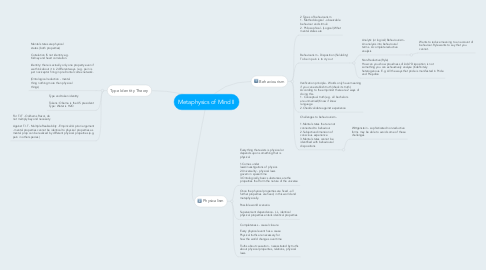Metaphysics of Mind II
por Anna Bromely


1. Physicalism
1.1. Everything that exists is physical or depends upon something that is physical 1.Comes under laws/investigations of physics 2.Universality - physical laws govern in space/time 3.Ontologically basic substances are the properties that form the nature of the universe
1.2. Once the physical properties are fixed - all further properties are fixed, in this world and metaphysically. Possible world scenario. Supervenient dependance - LL, identical physical properties entails identical properties
1.3. Completeness - causal closure Every physical event has a cause Physical truths are necessary for how the world changes over time Truths about causation - necessitated by truths about physical properties, relations, physical laws.
2. Type Identity Theory
2.1. Mental states are physical states (both properties) Correlation IS not identity e.g. Kidney and heart correlation. Identity: there is actually only one property even if we think about it in 2 different ways. (e.g. pain is just nociceptor firing in pre-frontal cortex network. (Ontological reduction - mental thing nothing more than physical things)
2.2. Type and token identity Tokens: Obama is the US president Type: Water is H2O
2.3. For T.I.T - Ockhams Razor, do not multiply beyond necessity Against T.I.T - Multiple Realizability - Empirical/A priori argument - mental properties cannot be identical to physical properties as mental prop can be realized by different physical properties (e.g. pain in other species)
3. Behaviourism
3.1. 2 Types of behaviourism 1. Methodological - observable behaviour and stimuli 2. Philosophical - (Logical) What mental states are
3.2. Behaviourism - Disposition (Solubility) To be in pain is to cry out
3.2.1. Analytic (or logical) Behaviourism - An analysis into behavioural terms. A complete reductive analysis
3.2.1.1. Wants to reduce meaning to an account of behaviour. Ryle wants to say that you cannot.
3.2.2. Non-Reductive (Ryle) How can you show proudness of kids? Disposition is not something you can exhaustively analyse (Indefinitely heterogenous. E.g. All the ways that pride is manifested in Pride and Prejudice
3.3. Verification principle - Words only have meaning if you can establish truth (check its truth). According to the empiricist there are 2 ways of doing this. 1. Conceptual truth (e.g. all bachelors are unmarried) Know if know language 2.Check/validate against experience
3.4. Challenges to behaviourism - 1.Mental states that are not connected to behaviour 2.Subjective dimension of conscious experience 3.Mental states cannot be identified with behavioural dispositions
3.4.1. Wittgenstein - sophisticated non-reductive forms may be able to avoid some of these challenges
